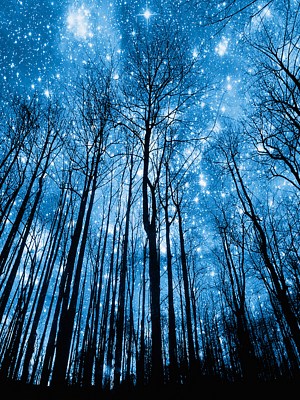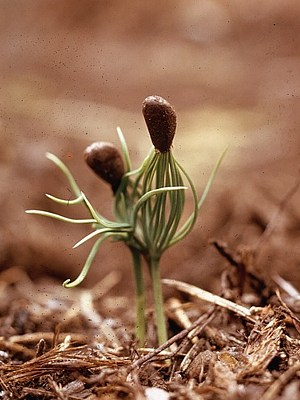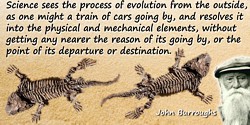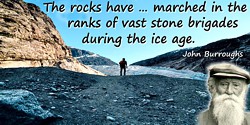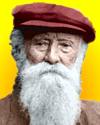 (source)
(source)
|
John Burroughs
(3 Apr 1837 - 29 Mar 1921)
American naturalist and author whose many writings and books, by celebrating nature in highly readable essays, significantly nurtured the conservation movement in the United States.
|
Great Questions In Little
Excerpt from Under the Apple-Trees (1916)
V. ASTRONOMIC GRANDEUR
[p.297] We humanize the nature we see around us in field and river and wood; we infuse ourselves into it; we fill the lap of earth with treasures not her own; but when we look up to the heavens, when we behold [p.298] the midnight skies, and ponder upon the truth that science reveals to us there, we are moved in a different way. And when we peer into the vista of the geologic ages our humanizing process does not come into play. In fact, the two great sciences, astronomy and geology, move us without any admixture of the human element; they move us by their grandeur, by the conception of time and space which they force upon us. In these fields science opens up to us views into the universe of non-living matter that not only challenge our reasoning faculties, but also stimulate our imagination, views that overwhelm us with a sense of power and magnitude. We do not see ourselves reflected there — we are swept away from ourselves, and impressed with our own insignificance. Astronomy is pure science. It reveals to us mechanical principles working on such a scale and with such harmony and precision that we get a new conception of these principles. They encompass the universe; they guide the stars in their courses, they are the builders and upholders of suns and systems. The cosmos is automatic, blind physical forces work there with mathematical exactness, but all is on such a scale and involving such an element of time and distance that we never think of it as mechanical. We do not see the wheels go round; we do not see the source or the distribution of the power; all is as fluid and spontaneous as a meadow brook. We do not see matter or motion as we know them upon the earth; [p.299] we see light and splendor and eternal repose. But the astronomer knows that the light and splendor are shed by inert matter, obeying the inexorable laws of celestial physics. If the stars sang in their courses, and the whole universe were alive, as some European scientists have audaciously affirmed, the facts would seem more in accord with the impression they give us than does the mechanistic conception of them. But the bare facts of astronomy are beyond our power of humanization; in their naked grandeur they strike us dumb. Whitman gives us a fresh impression of this when he opens his scuttle at night and sees far-sprinkled systems. He does not add to or take from the facts, but by his art he quickens our sense of limitless space and the wild dance and whirl of the heavenly hosts.
Celestial mechanics are certainly the same as terrestrial mechanics, and if we fancy that matter up there is any more spiritual than it is here underfoot, we are giving way to our humanistic tendencies. Starlight does not differ in its nature from lamplight, and the flight to us across the gulf of space has not changed its character. If the stars sing in their courses, then the earth sings in its course; if the celestial bodies thrill with life, the earth, too, thrills with life.
The universe is one, and not two or three. It is not symbolized by a straight line, but by the curve, which goes not in one direction, but in all directions, [p.300] or, rather, is without direction. It is that enigmatical contradictory thing. We cannot think of the universe as a whole, because a whole has bounds, and we cannot think of it as a part, because we ask where are the other parts?
VI. WHY AND HOW
We are told that the function of science is not to ask why, but how. This is largely true. Philosophy asks why. Science does not ask why we are here, but how we are here and how we stay here — how our food nourishes us, how our physical functions are carried on, how one form of life gives rise to another form, and the like. Science aims to give the reason of things, to trace secondary causes. It is dumb before the question of first causes. We often ask the question “Why” when we are really seeking the “How.” Why does a plant lean toward the light, why do the seasons change, why do rain and snow fall, why is the sky blue, why is snow white, why does the tide ebb and flow, when we are really in quest of the reason of these things—the how of them.
We do not know why the sky is blue, or the grass green, that is, for what purpose; or for what purpose the tides ebb and flow, or why a man stops growing at a certain age, or why water expands when it freezes. But we think we know why flowers are sweet-scented, or brightly colored, why some of [p.301] them have contrivances to secure cross-fertilization, why some seeds have hooks, others wings, and others springs. But all these “whys” are involved in the “hows” of the plants' getting on in the world. Why the child is afraid in the dark, and why the infant has such a strong grip in its hands, have good and sufficient reasons in the past history of the race. If we were to ask why the moon has no atmosphere, what we really want to know is, How happens it that the moon has no atmosphere, how was such a condition brought about?
VII. LIMITATIONS OF SCIENCE
On as sure ground as we know that food nourishes us, and fire warms us, do we not know that the soul is identified with the body, an organic part of it, growing with its growth, decaying with its decay, and dying with its death? Our philosophy or our theology may lead us to a different conclusion, but certainly our science cannot. The touchstone of science is proof or verification, but philosophy lives and moves and has its being in the region of the unverifiable — in the inner world of man's mental life — a world certainly as real as the outer world of his physical life, but of another order, and amenable to other laws.
We may say that the soul lived before the body lived, and will live after the latter is dead, but we cannot affirm it on scientific grounds, that is, on [p.302] grounds of physical certainty afforded by observation and experience. There are only two kinds of proof, mathematical proof, and experimental or scientific proof. There is not, and cannot be, such a thing as metaphysical proof, because metaphysical truths are unconditioned — they are like a sea without shores or land without boundaries. We may feel them to be real and true, while another man may not feel them so at all. But the truths of science and mathematics are true to all men. To dispute them is to dispute weights and measures. A path through the fields seems a very real thing: see it winding on ahead of us; our feet can find it in the dark, but it is only a phantom, a negation, an absence of something — a result of the attrition of many feet passing and repassing that way. Where are the tracks we made in last year's snow? The snow was real, and still, in some form, exists; and the feet were real, and may still exist; but the track was only a shape in a material thing.
In the printed page the only real things are the paper and the ink; the white spaces play the same part in aiding the eye to take in the meaning of the print as do the black letters. The type was real, and the mind and hands that shaped the type, and the compositor that set it up, were real, and the sense of the print is real to the mind, but not to the body. All this science affirms; what does philosophy affirm?
VIII. BEGINNINGS
[p. 303] The problem of the beginning of anything when philosophically considered is an elusive problem. Everything and every condition has its antecedents, and these antecedents have their antecedents. In spring the sap begins to mount in the trees, but to draw a line between its state of quiescence and its state of activity could only be done in imagination. It is not like a gun that is ready to go off when the trigger is pulled. It goes off slowly and insensibly. It is “fixing to begin to get ready” to go off all winter, as the old colored woman said about a like matter. The grain begins to sprout in the ground, but the insensible changes in the germ that have preceded the actual sprouting — what about them?
Things in nature begin, but they begin away back, and so gradually and insensibly that we cannot put our finger on the point of actual beginning; we have to imagine such a point. Spencer repudiates the theory of spontaneous generation, or the instantaneous birth of living matter from the nonliving, because such a theory admits of no steps or gradations in the process. The theory of generation by evolution is more thinkable — an immeasurably slow transformation of the non-living into the living without any fixed line between them.
If we cannot say that life ever literally begins, can we say that it ever literally ends? It is certainly true [p.304] that the inorganic is lifted into the organic, and it is as certainly true that the organic falls back again into the inorganic, and the movement we call life ceases. Spencer's position is a sort of philosophical puzzle. It is equivalent to saying that life like matter is infinitely divisible or reducible, so that the mind can never reach the point where life ends and the non-life begins. If in the case of matter we draw the line at the atom, it is an arbitrary line, so in the case of life, any line we may draw is an arbitrary line; life as a constant becoming and a constant ending is like a circle, returning forever into itself; it begins and ends at every imaginary point. The old puzzle that motion is impossible because a body cannot move where it is, nor where it is not, is easily disposed of by taking one step. We are forced to the conclusion that life on the globe did begin, and that it will in time as surely end.
Kindling a fire by friction might symbolize Spencer's idea of the evolution of life. When does the fire begin? Every moment in the process has its antecedent moment back to the original elements and forces that built up the wood in the tree, and the first molecule of smoke that appears can be infinitely divided, yet combustion finally takes place.
As we go down the scale of animal life toward the vegetable, there must be a point where consciousness — the feeling of pleasure and pain — begins. [p.305] No matter how minute the gradations, unless we allow our minds to be fooled with the old philosophical puzzle of the infinite divisibility of space, we come to a point in thought where consciousness dawned. (To be and not be in the same moment of time, that is the puzzle.) In like manner, as we go down the scale of the organic toward the inorganic, we must come to a point where one ceased and the other began. By the process of reasoning that proves that Achilles could never overtake the tortoise, we may prove that evolution of life never began, the organic could never overtake the inorganic. But the fact that once it was not here and is here now, shows the fallacy of such reasoning.
The evolution of one animal form from a previously existing form has been an equally gradual process. The horse did not begin as the horse; he has been becoming horse through countless ages. So with all other forms. The descendants of a species which we find in one geologic horizon turn out to be something vastly different in a later geologic horizon. The passage from one species to another actually took place, yet where can you draw the line between them — between the non-man and the man?
The clock begins to strike, the clock itself as a piece of machinery had a beginning, the man who made the clock had a beginning in his mother's womb, but the beginning of the germ cell from [p.306] whence he sprang — where was that? If we could trace it back to the unicellular life of Cambrian times, could we find its beginning then?
All these questions about the beginning of things return forever into themselves; and their final solution baffles us.
IX. EVOLUTION
We are apt to think the book of evolution closed, the tale finished. But can it be true? The evolution or transformation of the earth's surface certainly is not finished, and never can be finished. As long as the rains continue to fall, and the seasons to change, and vegetation to grow, the land surface of the globe must continue to alter. As long as the secular cooling of the earth goes on, the crust must continue to fold and in places to be lifted up. Geology shows us that millions of years ago it was vastly different from what we now behold it. How will it be as many millions of years hence? How different, too, was the animal life of the globe during the past geologic periods from the animal life of to-day! Will it not differ as much from that of to-day millions of years hence? The changes and transformations will doubtless be slower in the future than in the past, because the globe is older, life is older, the physical forces are less riotous, life is less gross and turbulent; still, radical changes must slowly appear. I cannot believe that the race of man has run its evolutionary [p.307] course. One cannot see where there is any room for a physical change, but the mental growth may be enormous, incalculable. All our theories of knowledge, all our beliefs, are founded upon the assumption that we have reached the summit of human life. But just as the men of a few centuries ago were children in the arts and sciences, compared with us, so we shall doubtless appear as children when compared with men a few centuries hence. The mental powers of man may not have increased since Aristotle and Plato, but that is only a brief time. Local, and, as it were, accidental, causes may account for that. Wait five or ten thousand years, and then see. It is a long road and it is up and down hill. Man is now armed with the weapons of science as he never has been before, and his conquest over Nature is bound to be more and more complete.
Whole tribes and families of animals have become extinct in the past, and others will probably become extinct in the future, but one can think of the race of man as becoming extinct only on some radical cosmic change in the earth, such as there has been in some of the other planets and in our moon. This change will come, but not in millions of years.
Unless the waste of the fertility of the land into the sea through man's agency is checked, the fertility of the soil in the course of countless ages will no longer support the race, but this as a cause working against the perpetuity of the race can be and doubtless [p.308] will be checked. The fuel in the earth will be exhausted in a thousand or more years, and its mineral wealth, but man will find substitutes for these in the winds, the waves, the sun's heat, and so forth.
- Science Quotes by John Burroughs.
- 3 Apr - short biography, births, deaths and events on date of Burroughs's birth.
- John Burroughs - The Friendly Rocks - an excerpt from Under the Apple-Trees (1916), giving a naturalist's view of rocks: “The rocks are not so close akin to us as the soil ... [but they] are the final source of all.”
- John Burroughs - context of quote “Stone brigades” - Medium image (500 x 250 px)
- John Burroughs - context of quote “Stone brigades” - Large image (800 x 400 px)
- John Burroughs - context of quote “Evolution” - Medium image (500 x 250 px)
- John Burroughs - context of quote “Evolution” - Large image (800 x 400 px)
- “A Prophet of the Soul” - John Burroughs on Henri Bergson’s philosophy.
- John Burroughs - Chap XV - 01 The Ether - from Under the Apple-Trees (1916).
- John Burroughs - 'Scientific Faith', from The Outlook (1911)
- Theodore Roosevelt - naturalist - In Memoriam by John Burroughs in Natural History magazine (1913).
